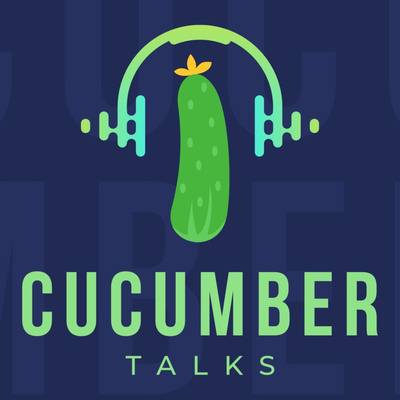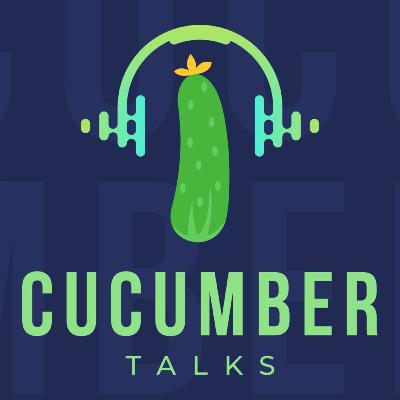Discover Cucumber Talks
Cucumber Talks

Cucumber Talks
Author: Cucumber Talks
Subscribed: 0Played: 48Subscribe
Share
© Cucumber Talks
Description
Cucumber Talks is a space for having honest conversations about faith, religion, and beliefs. Hosts David, Marshall., and Bryce all grew up Christian but are now at very different places when it comes to God. Listen as they chat with Christians, non-Christians, and everything in-between to gain new insights and perspectives.
76 Episodes
Reverse
Today’s guest is Emily Weber, the host of the Adventist Millennial Podcast.
Emily grew up in the Seventh Day Adventist Church and still identifies as an Adventist, although she now has more nuanced beliefs about the SDA church and its culture.
Here’s what we discussed:
- Common stereotypes of Seventh-Day Adventists
- How Emily would like to see the SDA church improve
- Why the SDA church is losing the younger generation
- The pros and cons of churches imposing strict rules on their members
- Selflessness vs selfishness
- And much more!
Resources mentioned in this episode:
Adventist Millennial Podcast
The God-Shaped Heart by Dr. Timothy Jennings
Mere Christianity by C.S. Lewis
Books by Graham Maxwell
Contact Cucumber Talks
Learn more about Bryce, David, and Marshall
Have questions, feedback, or interested in coming on the show? Shoot us an email: cucumbertalks@gmail.com
Today’s guest is Clint, the host of The Psychedelic Christian Podcast.
Clint founded The Psychedelic Christian Podcast as a way to spark conversations about psychedelic drugs and the Christian faith.
Here’s what we discussed:
- Clint's experiences with drugs and alcohol growing up
- How Clint's first psychedelic experience helped him overcome shyness and cynicism
- Whether or not substance use is compatible with the Christian life
- How to come out to friends and family about drug experiences
- And much more!
Resources mentioned in this episode:
The Psychedelic Christian Podcast
Drug Use for Grown-Ups by Dr. Carl Hart
How To Change Your Mind by Michael Pollan
Ligare: A Christian Psychedelic Society
Contact Cucumber Talks
Have questions, feedback, or interested in coming on the show? Shoot us an email: cucumbertalks@gmail.com
Today’s guest is David Ames, the host of the Graceful Atheist Podcast.
The Graceful Atheist Podcast takes a look at stories of faith transition, doubt, deconstruction, and how to live a graceful life post-deconversion.
Here’s what we discussed:
David’s deconversion experience after attending Bible college
Why Atheists should be “for something” instead of just being against religion
The importance of challenging your beliefs and exploring doubt
What grace means in a secular context
And much more
Resources mentioned in this episode:
Graceful Atheist Podcast
Deconversion Annonymous Facebook Group
Doubt, A History by Jennifer Hecht
Universal Declaration of Human Rights
Contact Cucumber Talks
Have questions, feedback, or ideas for the show? Shoot us an email: cucumbertalks@gmail.com
Today’s guest is Jon Adams, the founder of the Discover Christian Mysticism With Jon Adams YouTube channel. Jon is also the pastor at Like Christ Mcallen church and author of Jesus: A Field Manual.
Here’s what we discussed:
How Jon’s faith evolved to an experiential mystical Christian practice
Why Jon stopped giving traditional sermons at his church
What most churches get wrong when it comes to discipleship
Jon’s thoughts on meditation and psychedelics
And much more
Resources mentioned in this episode:
A Course in Christian Mysticism by Thomas Merten
The Doctrine of Deification by Normal Russell
Altered Traits by Daniel Goleman Richard J. Davidson
Christian Mysticism inspired music: @davidgl.music
God in our experience with Jon Adams Podcast
Like Christ Mcallen Church
Discover Christian Mysticism With Jon Adams YouTube channel
Contact Cucumber Talks
Have questions, feedback, or ideas for the show? Shoot us an email: cucumbertalks@gmail.com
Today’s guest on Cucumber Talks is Rev. Chris Rothbauer, a Unitarian Universalist minister serving a congregation in Auburn Alabama.
Here’s what we discussed:
Chris got involved in church as a teenager. However, the churches they attended said their sexuality was a sin. This pushed Chris to the brink of suicide and to leave the church altogether
While studying philosophy abroad in England, Chris was introduced to Unitarian Universalism
Chris quickly found meaning within the Unitarian Universalism community and felt called to go to seminary school
Michael Servetus was an early influencer of Unitarianism. His book The Errors of the Trinity suggested that the Trinity was non-Biblical
Unitarianism began spreading after Servetus was put to death
Universalism emerged as people began asking why an all-loving God would condemn some to hell
Unitarianism and Universalism merged in 1961
Unitarian Universalism is less about right belief and more about right action
the Council of Nicea’s vote narrowly came down on the side of the Trinity
Like many modern Unitarian Universalists, Chris doesn’t consider themself a Christian. Their practice leans toward religious naturalism these days
Some of the early US presidents and founding fathers as well as famous transcendentalists like Ralph Waldo Emerson were Unitarians
Humanism had a major influence on UU in the 20th century
UU is about people sharing similar values instead of the same beliefs
The structure of UU services is similar to traditional protestant churches
UU tends to not focus on evangelicalism. This is one of the reasons for its decline in popularity.
According to Chris, many UU members come from abusive Christian backgrounds
UU is very visible at social justice events
Chris believes that one of the strengths of UU is that they continually evaluate their values and allow them to evolve over time
The majority of UU members do not believe in hell and see it as a metaphor for when people are at odds on Earth
Chris’s church attracts many “spiritual refugees”, a term they use to describe people who have wounds from negative experiences in evangelical churches
UU believes that all people have inherent worth and dignity but some beliefs don’t
Chris believes that change rarely happens through intellectual discussions, but instead through relationship building
The biggest spiritual lesson Chris has learned is to ask yourself if you’re making the world a better place or not. This is religion and spirituality at its best
Resources mentioned in this episode:
- Learn more about Chris: Revchris.faith
- On the Errors of Trinity by Michael Servetus
Contact Cucumber Talks
Have questions, feedback, or ideas for the show? Shoot us an email: cucumbertalks@gmail.com
Today’s guest on Cucumber Talks is Jennifer, a YouTube creator, model, and actress. Jennifer makes videos on her YouTube channel Jenncysworld about her Christian faith and what it’s like living in Seoul, South Korea
Here’s what we discussed:
How Jennifer discovered Hillsong while living in London.
Why Carl Lentz, a former Hillsong pastor, originally attracted Jennifer to Hillsong.
How many Hillsong volunteers and staff get burnt out and eventually leave the church.
Why Hillsong attracts so many people who feel rejected or are going through hard times because they offer a feeling of belonging and community
Why Jennifer believes Hillsong is a church that has cult-like tendencies
An experience that made her question how Biblical the church was.
Why it’s so difficult to leave a church like Hillsong and how Jennifer found the courage to leave
Resources mentioned in this episode:
- Jenncysworld YouTube Channel
- Hillsong Church, God Goes Viral BBC Documentary
Contact Cucumber Talks
Have questions, feedback, or ideas for the show? Shoot us an email: cucumbertalks@gmail.com
Today’s guest on Cucumber Talks is Abraham, an expat currently living in Mexico who has been a part of the Truther community for over 15 years.
Here’s what we discussed:
Abraham is a Canadian-born expat currently living in Mexico. He grew up Christian but started questioning his beliefs after the September 11th attacks
Abraham defines the Anunnaki as an inter-dimensional species that came down to earth over 3000 years ago. They genetically modified humans in order to mine gold for them
According to Abraham, the Anunnaki interbred with humans. This created a bloodline that exists to this day
Truthers often use the word “They” to refer to families with generational wealth that have interbred with each other over the years to keep their bloodline “pure”, for example, the Rockefellers and the Duponts
Abraham was kicked off Twitter and Instagram for sharing memes related to these generational families
A small group of “bad” Anunnaki is manipulating us to keep us dumbed down. Their end game is to have control
The Anunnaki were a global civilization that expanded across all the early major civilizations.
Abraham believes there’s we’re in a spiritual battle for our mind right now.
It’s possible that the Anunnaki exist on a different dimension that’s not visible to most humans
Abraham is passionate about helping people wake up to the truth so that they can begin to manifest a more positive reality
Some truthers speculate that the Anunnaki intentionally keep humans at a lower vibration to feed off emotions and transmit them into “loosh”
Humans can raise their frequency by eating healthy, exercising, helping others
Major spiritual teachers throughout history such as Jesus, Buddha, and Mohammad had a message that runs counter to the Anunnaki - that we’re important and have a purpose
Abraham suggests starting with 9/11 and Jeffery Epstein conspiracies to people curious about the truther community
The bloodline families orchestrate large scale events like 9/11 and Covid in order to manipulate us and achieve their objective of keeping the masses in a low vibration
It may seem like the Anunnaki descendants have all the power, but in reality, we outnumber them. All we have to do is wake up and live outside of the low frequency
The Anunnaki communicate through symbolism in media and movies to give us hints of what’s coming in the future
At the end of the day, humans have free will and can make their own choice whether to live in darkness or the light
Resources Mentioned In This Episode:
Tin Foil Hat Podcast with Sam Tripoli
The Midnight Gospel, Duncan Trussell
Contact Cucumber Talks
Have questions, feedback, or ideas for the show? Shoot us an email: cucumbertalks@gmail.com
Today’s guest on Cucumber Talks is Shara Drimalla, a content writer for Bible Project, which is a nonprofit animation studio making the unified story of the Bible accessible to everyone everywhere.
Here’s what we discussed:
How Shara used Bible Project videos while she was a high school Bible teacher and later achieved her dream of working at Bible Project
Bible Project’s upcoming Paradigm series and upcoming app release. Paradigm is Bible Project’s breakdown for how to read the Bible
How Shara reads the Bible differently now than when she was in her 20s.
How as kids the Bible was mostly a collection of disjointed stories
Some people, particularly seminary students, are reluctant to change their beliefs about the Bible
What is the Bible NOT? Shara believes the Bible isn’t a rulebook, a theology dictionary, or a devotional grab bag. Despite good intentions, people who read the Bible in these ways are making it into something it’s not.
Shara’s and Bible Project’s view is that the Bible is one unified story that leads to Jesus.
The Bible is an ancient book written in multiple literary styles with a variety of authors and languages other than English. Applying a plain modern reading of the Bible is not an accurate way of truly understanding it.
Why it’s important to read the Bible as one unified story, even if you’re not a Bible Scholar. Resources like Bible Project make the Bible’s story more accessible and easy to understand
How to approach the Bible like you’re visiting a foreign country instead of approaching it with your cultural view of the world
The Bible is full of design patterns that weave together an amazing story.
Shara summarizes the entire Bible’s unified story from Genesis to Revelation
There are different views on the atonement, what Jesus’s death and resurrection actually meant.
The Hebrew Bible (Old Testament) pointed toward Jesus. The authors in the New Testament show what Jesus’s death meant by referencing the Old Testament
Jesus’s message was countercultural and multicultural. He introduced a new way to be human and invited everyone, not just Jews.
Expanding the Kingdom of Heaven is about spreading the story of Jesus. The Kingdom of Heaven on earth exists wherever there are followers of Jesus
Shara gives an overview of Bible Project’s 7 Pillars which describe their approach to reading the Bible
The benefits of reading the entire Bible in Chronological order and Bible Project’s resources that help
Openhanded and closehanded issues in Christianity, agreeing on the core beliefs every Christian should hold vs Biblical views that are more up for interpretation
Resources Mentioned In This Episode:
The Lost World Series by John Walton
Bible Project - How to Read the Bible
Exploring My Strange Bible Podcast - The Amazing Jonah
More Bible Project videos:
Sacrifice and Atonement
Tree of Life
Gospel of the Kingdom
Heaven and Earth
Contact Cucumber Talks
Have questions, feedback, or ideas for the show? Shoot us an email: cucumbertalks@gmail.com
In this episode, Bryce, David, and Marshall open up about how they decide whether to quit something or to keep pushing forward. They even share how they've considered quitting this podcast - and why they're sticking with it instead of giving up.
Have questions or feedback? Get in touch: cucumbertalks@gmail.com
The guys share their experiences celebrating (and not celebrating) Halloween. They also discuss what type of Halloween costumes they approve of and the best ways to celebrate Halloween.
Have questions or feedback? Get in touch: cucumbertalks@gmail.com
The guys debate about whether Hillsong music is Biblical or not. What does "being Biblical" even mean? Is it our place to judge whether something is Biblical? And does listening to music with lyrics help or hinder one's spiritual development?
Have questions or feedback? Get in touch: cucumbertalks@gmail.com
The guys share their opinions on whether the popular new Netflix show Squid Game is appropriate for Christians (or anyone) to watch.
Bryce, David, and Marshall all grew up in conservative Protestant Christian homes but now have different perspectives on Christianity and culture. Subscribe to listen each week where they have discussions about the church, faith, culture, and relationships.
Have questions or feedback? Get in touch: cucumbertalks@gmail.com
Marshall, Bryce, and David have a discussion about whether homeschooling is the best option for kids.
The conversation starts with the pros and cons of homeschooling, then becomes a broader talk about how much influence parents should have over their kid's decisions.
Have questions or feedback? Get in touch: cucumbertalks@gmail.com
Is it okay for Christians to curse and use swear words? What about consuming media that contains vulgar language? Bryce, Marshall, and David share their opinions on this divisive topic.
Questions and Feedback: cucumbertalks@gmail.com
David, Marshall, and Bryce share their thoughts on Christian Mysticism and Protestantism.
Connect with Cucumber Talks on Twitter @cucumbertalks
Questions and Feedback: cucumbertalks@gmail.com
David, Marshall, and Bryce try to figure out what exactly NFTs are and whether Christians should embrace this new technology.
NFTs are the latest technology trend in the crypto world. They’ve been generating a lot of buzz online and in the real world. NFT art and collectibles have sold for crazy amounts of money - with one NFT artwork selling for $69 million in March this year. Is this new technology the future of art and collectibles? Or is it all a big speculative bubble based on greed that’s going to come crashing down?
Connect with Cucumber Talks on Twitter @cucumbertalks
Questions and Feedback: cucumbertalks@gmail.com
The guys debate whether the USA is the best country in the world for Americans to live in. David and Marshall explain why they believe it is and Bryce argues why it's better (for most Americans) to live abroad.
Selected links from the episode:
Fair Sentencing Act (Disparity between crack cocaine and powder cocaine sentencing)
WTF Happened in 1971
In this episode, Marshall talks about his need to make more friends, Bryce shares an essay he wrote about Kanye West, and David shares his biggest pet peeves.
Selected links from the episode:
Bartleby, The Scrivener: A Story of Wall Street by Herman Melville Audiobook
In this episode David discusses locus of control, Bryce asks what the meaning of life is, and Marshall tries to set up a better system for checking email.
In this episode, Bryce tries to stop being so self-righteous, Marshall talks about his phone usage, and David shares strategies that help him stay focused.
Selected links from the episode:
Brave Browser
DuckDuckGo
ProtonMail
Tristan Harris, Tim Ferriss Show
Distraction Free YouTube







